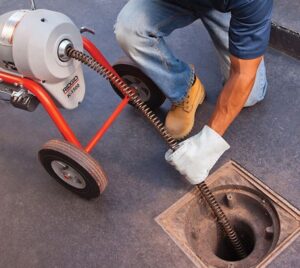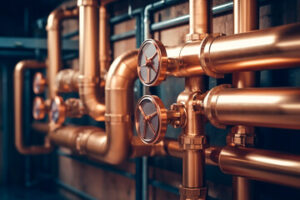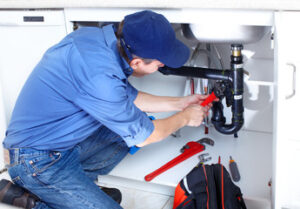Drain Cleaning is a vital part of maintaining your home’s plumbing system. Neglecting drain cleaning can lead to clogged, slow-moving, or smelly drains.
A professional Aurora CO Drain Cleaning company can prevent toxins like bacteria, fungi, and molds from building up in your pipes. However, this service does not solve more serious sewer or drainage issues.

Clogged drains are every homeowner’s worst nightmare, often happening at the worst possible times. Not only do they cause backups, odors, and other problems that can affect your daily life, but they can also lead to expensive and destructive pipe damage. Knowing what to look for and how to prevent and treat a clogged drain can save you time, money, and a lot of headaches.
Most clogged drains are caused by food, hair, and soap residue that builds up over time. Many of these clogs can be prevented by regularly running hot water down your drains after cooking or showering, using a drain cover over bathtub and sink drains, and keeping nearby trees well-maintained and trimmed so they don’t block your drain lines.
Sometimes, a simple plunger or over-the-counter drain cleaner may be all it takes to clear up a drain clog. But if the problem persists, it might be time to call in a professional.
Some clogs are so stubborn that they require more advanced tools, such as a wire drain snake. If the clog has yet to be addressed quickly, it can result in broken pipes that can cost thousands of dollars to repair.
Another great way to keep your drains flowing smoothly is by regularly squirting grease-fighting dish soap down them. This can help dissolve greasy clogs stuck in your drains for too long and will not harm your pipes or the environment.
One of the most common reasons you need to schedule plumbing services is because your sinks or showers are draining slowly. Usually, this is just a minor issue and will correct itself over time. But if you address it, it can avoid becoming a big problem.
Slow drains often happen from clogs. These can be right at the stopper or further down the drain pipe. You can remove some debris using a pair of pliers or a drain snake. However, if the issue is deeper into your pipes or septic system, it might be a more serious problem that requires professional help.
Sometimes, a drain can get so clogged that it stops working completely. If this happens, you might have to use a plunger or chemical drain cleaner. But these can be messy and could be better for your pipes or the environment.
It would be best if you prevented slow drains by cleaning your sinks and tubs regularly. You should also clean your stoppers, which collect hair, soap scum, and other debris. You should also pour hot water down your drains now and then to rinse away some of the grease or oils. It would be best if you also made it a point to clean your garbage disposal regularly.
One of the best ways to prevent clogs is by adding baking soda and vinegar to your routine. This is similar to those volcano science experiments you did in elementary school, but this time, it works. The mixture creates carbon dioxide bubbles that break up clogs and clear the drain. You can use this every week to keep your drains clean. This method is especially helpful if you have a grease-clogged drain since it will dissolve most of the oil and fat. But if your drain is still slow, it may be time to call a plumber. They can perform a plumbing inspection and send a camera down your pipes to determine the cause of the slow drain.
Sewage is one of the most offensive smells in a house. It comes from a mix of inorganic gases that result from the anaerobic decomposition of sewage and sludge. This mixture of gases can contain hydrogen sulfide, ammonia, carbon dioxide, methane, and nitrogen.
Determining where it’s coming from is the first step if a sewer odor permeates your home. The odor could be from a clogged drain if isolated to one room. However, if the smell is carried from room to room, it could indicate a more serious problem with your home’s plumbing.
A dripping sink faucet or a leak in the walls or ground may be the source of the sewage odor. If this is the case, it’s important to act quickly. A leaking pipe can cause severe damage to your home and needs to be fixed immediately.
Another potential cause of a sewage smell is flushing items that should not be flushed down your toilets. Items like baby wipes, dental floss, hair ties, and cat litter can cause septic system blockages if they aren’t properly disposed of in the trash. You can avoid this by only flushing waste and toilet paper down your drains.
Over time, drains can accumulate hair, food scraps, grease, and other debris that cause odors. This can be prevented by regularly cleaning your drains with a baking soda and vinegar mixture or a professional-recommended drain cleaner. You can also add a charcoal-based odor absorber to your drains to neutralize foul odors.
Sometimes, a smelly drain results from a simple mistake made by a plumber or contractor. A common error is forgetting to install or maintain a drain trap or sewage vent. In these cases, the resulting odors can be extremely unpleasant and require immediate attention.
Your home’s sewer line is an important part of your plumbing system. It carries waste and water into your septic tank or to the municipal line in the alley/street. Keeping these lines clear and in good working condition is vital so you don’t experience sewage backups and other problems.
A clogged or broken sewer line can create expensive and hazardous conditions for your home. If you don’t maintain your sewer line, it can become a serious problem that puts your family and pets at risk.
While you can do your best to avoid clogs by avoiding items like grease and feminine hygiene products that aren’t meant to be flushed, sometimes you’ll need help from a professional plumber. If your drains seem to be getting clogged more frequently or you’ve tried plunging and drain cleaner with no luck, it’s time to call the professionals to inspect your sewer line thoroughly.
There are a few signs that it’s time for a sewer line cleaning or repair:
1. Foul Odors: If you notice persistently foul smells coming from your drains, it may indicate a blockage in the sewer line. The smell is from raw sewage backing up your home from the main line. It’s an urgent issue that requires immediate attention.
2. Multiple Clogs: If you’re experiencing clogged drains simultaneously in multiple parts of your home, it’s likely due to a blockage in the main line. The best way to diagnose this is to call in a professional who can use a camera inspection and a special drain clearing “auger.”
3. Cracks or Bellies in the Sewer Line: Aging pipes can crack or develop belly sections that allow solids to build up over time. This can cause them to break or collapse. Regular maintenance by a professional can prevent this from happening.
If you have a tree root intrusion problem, scheduling routine maintenance for your sewer line is also an excellent idea. This will help reduce the number of roots that get into the pipes and cause clogs.





